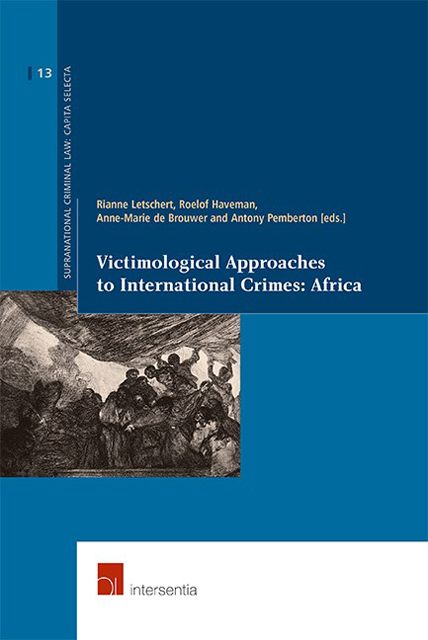Book contents
- Frontmatter
- Words of Appreciation
- Contents
- Introduction: Victimological Approaches to International Crimes
- Part I Victims of International Crimes
- Part II Reparative Justice
- PART III Amnesty, Truth, Reconciliation and Tradition
- Part IV International and National Legal and Policy Approaches
- Part V Victimological Approaches to International Crimes
- The Authors
- Bibliography
XVII - Universal Justice?: The Practice and Politics of Universal Jurisdiction Cases Relating to Crimes Committed in Africa
Published online by Cambridge University Press: 24 November 2022
- Frontmatter
- Words of Appreciation
- Contents
- Introduction: Victimological Approaches to International Crimes
- Part I Victims of International Crimes
- Part II Reparative Justice
- PART III Amnesty, Truth, Reconciliation and Tradition
- Part IV International and National Legal and Policy Approaches
- Part V Victimological Approaches to International Crimes
- The Authors
- Bibliography
Summary
INTRODUCTION
Jurisdiction is the basis upon which courts derive their authority – the limits or contours of their competence to take up a particular matter. Usually, courts will have the jurisdiction to deal with events which occurred with in their State's territory, withnationals of that State or withcrimes which have had an impact on the interests of that State even if committed by non-nationals.
Universal jurisdiction is an additional basis for jurisdiction which recognises that the most serious crimes under international law are crimes which off end the sensibilities of the international community as a whole. As such, all States have the ability, and at times the obligation, to ensure that justice is done by investigating, witha view to prosecuting, individuals accused of certain crimes recognised as the most serious, regardless of where the off ence took place and irrespective of the nationality of the accused person or the victim.
The principle of universal jurisdiction is recognised in a number of treaties including the 1949 Geneva Conventions, which require each of the High Contracting Parties to “seek out and prosecute” persons alleged to have committed, or to have ordered to be committed, such grave breaches of the Conventions, and “shall bring such persons, regardless of their nationality, before its own courts”. The related ‘prosecute or extradite’ requirement is recognised in the UN Convention Against Torture, which requires States to investigate witha view to prosecuting suspects of torture where there is no extradition request from another country, and this requirement is replicated in approximately 61 multilateral conventions at the universal and regional level including the European Convention on the Suppression of Terrorism, the International Convention against the Taking of Hostages and the International Convention for the Protection of All Persons from Enforced Disappearance, and has further been recognised by some scholars as a general duty of customary international law, at least as it concerns certain categories of crimes. Other crimes over which universal jurisdiction and/or the related ‘prosecute or extradite’ jurisdiction can be exercised include: genocide, crimes against humanity, enforced disappearances, slavery, and terrorist offences.
- Type
- Chapter
- Information
- Victimological Approaches to International Crimes: Africa , pp. 439 - 462Publisher: IntersentiaPrint publication year: 2011



